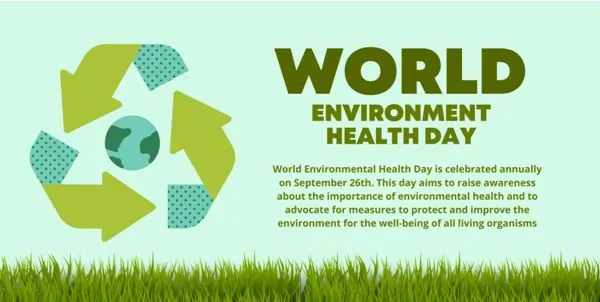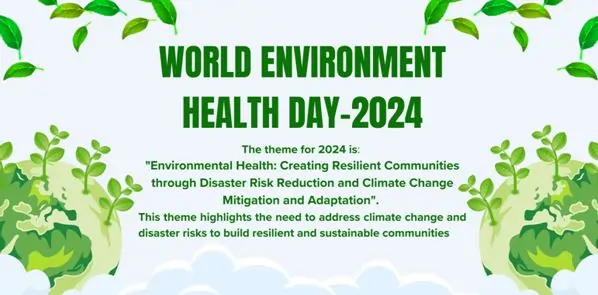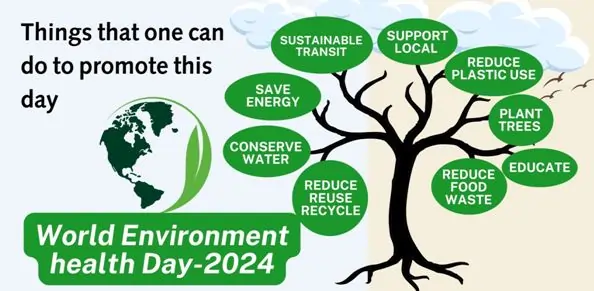
World Environmental Health Dayis celebrated on the 26th day of September every year.
This day is associated with promotion of significant role of environmental health and searching for
adequate means to enhance the state of the environment necessary for the life of all inhabitants.
Environmental health in turn contains several areas such as pollution control by air and water,
waste disposal and control of environmental risks. Harmful environmental factors contribute to the
development of health issues of different severity, including respiratory tract infections or waterborne
diseases. Climate change mitigation and adaptation constitute other subthemes of environmental health
as mainly on eliminating the emissions of greenhouse gases, renewable energy, efficient energy use and
afforestation. Mitigation means changing people’s behaviours and making necessary modifications in the
environment for a suitable climate through hard and soft measures like developing crops that can
withstand drought and improving irrigation systems.
World Environmental Health Day is a reminder that environment
conservation is not simply the preservation of the natural world,
but a protection of people’s health and the future. Therefore, as people group themselves together
in communities, it becomes easy to put good measures to practice to
enable them live healthy lives despite the calamities that may be
occasioned by the environment. It is therefore important that on
this day we pause and reflect on how we can improve environmental
health and go to greater lengths to improve environmental health
to do this we need to embrace environmental health as the way through
to a better and healthier future for everyone.
Historical Background
IFEHestablished this day on 26th September, 2011 in a summit it convened in Indonesia Country. The International Federation of Environmental Health (IFEH), founded in 1986, and being situated in London, UK currently embraces 44 member nations, and its main goal is to increase the awareness level concerning the role of environmental health. This serves as a means of educating the people several aspects of environment that might in one way or the other have an impact on health such as air and water quality, solid waste disposal, and impact of hazardous substances all of which are very vital.
World Environmental Health day is an awareness day, the day mainly focuses on a specific theme on environmental health. This is particularly designed to address modern global challenges and to promote the practices that can help the world become a better place both for the people and the environment.This day is marked by various activities such as seminars, workshop, meetingsetc. It provides a forum for people, organisations and governments to come together and consider strategies for creating better and more sustainable forms of community.
Why we Celebrate this day?
World Environmental Health Day is the international celebration held every year on the 26th of September with the purpose of increasing the awareness of people around the world about the part played by environmental health in their lives. This day regards the environment and human health as closely linked to each other.Main objective of WEHD is to create awareness about the fact that habitat is an important component of health, not only of a specific species, but of the whole biosphere. Environmental health covers areas of habitat, atmosphere, water and soil, and the control of toxic substances in the environment. It is noteworthy that unfavourable environmental conditions are the root cause of many diseases, for example, respiratory diseases, waterborne diseases and chronic diseases.

Through the celebrations of the World Environmental Health Day, people, groups, and governments have a chance to sit down and plan on measures to take in enhancing health in environmental context. Lectures, training sessions, conferences, fairs, and other events are held to enable the community to become aware of practices that need to be implemented. We actually have this day in order to fully remember that we should preserve our environment for the future generations, that to be able to develop sustainable communities, the primacy of collective processes and strategies cannot be overemphasized in the face of threats and consequences from the environment. We should utilize this day as a catalyst for social change and start making preparation towards development of sustainable environment.
The actions conducted internationally related to the World Environmental Health Day:
Several worldwide endeavours are aligned with the objectives of the World Environmental Health Day, which is to enhance environmental health as well as encourage environmentally friendly practices, such as:
- Sendai Framework for catastrophe Risk Reduction: This endorsed at the UN framework aims at preventing catastrophes and creating resilience while factoring climate change mitigation and adaptation into development. It marks the area of environmental health in the mitigation of catastrophes’ risk.
- UN Decade on Ecosystem Restoration: Initiated by UNEP and FAO, aiming at halting and building up the lost environmental stocks in various parts of the world. They aim at rehabilitating 68 million hectares of land and create around 15 million employment opportunities by the year 2030.
- Paris Agreement on Climate Change: This global pact aims at reducing emission of gases that cause a greenhouse effect in order to avoid global warming. It calls on governments to adopt green policies that protect the environment and promote the population’s and countries’ ability to cope with adverse climate shifts.
- WHO’s Green Manifesto: Currently, the World Health Organization (WHO) encourages the implementation of measures that reduce the generation of waste and plastics, the elimination of smoke, the integration of mental health with climate change.
- Global Environment Facility (GEF):A total of 183 nations cooperating with international institutions, civil societies and private initiatives to resolve global environmental issues.GEF finances programmes on improving the state of the environment regarding such issues as biodiversity, climate change, and sustainable use of land.
They demonstrate global care about environmental health and community’s sustainability and resilience.
India’sefforts for the World Environmental Health Day
Some of the activities that India has conducted periodically in order to enhance the status of environmental health andcomply with the objectives of the World Environmental Health Day are:
- Swachh Bharat Abhiyan (Clean India Mission): This is a Central Government supported countrywide flagship program that began in 2014 under the themes of cleanliness, sanitation, and waste management. Among them it tries to eliminate the practice of open defecation and also improve the methods of proper disposal of solid wastes.
- National Clean Air Programme (NCAP): Starting in 2019, NCAP aims at the reduction of air pollution rate at the national level. It includes strengthening the air quality networks, advocating better technologies, and adopting measures of pollution control.
- National Action strategy on Climate Change (NAPCC):this comprehensive program approaches towards climate change with initiatives like National Solar Mission and National Mission for a Green India etc. These missions focus on the promotion of the use of renewable energy resources, efficiency in the use of energy and increase of forest cover etc.
- Panchamrit Initiative: This five-point blueprint drew by Prime Minister Narendra Modi at the COP-26 meeting of 2021 is proposed to tackle climate change. It includes the increase in capacity of non-fossil fuel based sources, ensuring future energy demand by renewable sources and achieving net zero emission by 2070.
- LiFE (Lifestyle for Environment) Movement: This program that has been initiated in 2022 is meant to foster sustainable lifestyles and personal actions in the preservation of the environment. It aims to create a global community of “Pro-Planet People” who would align themselves to green behaviour.
- Nagar Van Udyan project: This project is involved in establishment of urban forests in cities in order to create green spaces and improve quality of air in these cities. Its aim is to build at least one city forest in each city of having a Municipal Corporation.
- National Wetland Conservation Programme (NWCP): This project aims to conserve and mitigate wetlands all over the country to emphasize on its importance to balance of ecosystems and support of species diversity.
These programs call attention to some of the ways India is working toward the fruitful improvement of environment quality and the building of more sustainable societies. In this way, India is to resolve such environmental issues and improve the population’s standard of living through these projects.
Things that one can do to promote this day

The maintenance of environmental health will always be something that one can do through the recommendation of simple sustainable measures that one can perform on first instance without necessarily having to be called upon to do in the future, one can practices such as:
- Reduce, Reuse and Recycle: Consume less, and when you do, make use of products that can be reused again and proper disposal of those things that cannot be reused such as plastics, glasses etc.
- Conserve Water: Get water saving appliances, fix the leaks and minimize the use of water which could be done by opting for fewer showers.
- Save Energy: Switch off any light that is not in use, power off appliances that are not in use, using energy efficient equipment and replacing regular power sources with natural and renewable sources like solar, wind and hydal energy.
- Sustainable transit:Walk, use bicycles, share a ride or use public means of transport in order to reduce your carbon footprint. If possible switch to electrical or hybrid cars”.
- Support Local and Organic: Eat seasonal foods and local foods and use organic foods lessening the environmental impacts of transportation and chemical use in foods.
- Reduce Plastic Use: Refuse to use the plastic products that are used once and then discarded by using properly sized and designed bags, bottles and containers.
- Plant Trees and Gardens: Trees take in CO2 and release oxygen in a process. Starting a garden may also assist to enhance the local fauna and flora and reduce the dependence on chemical fertilizers and chemicals.
- Educate and push: Encourage the public to act and support environmental issues and educates people in order to protect the environment. Be active in the community and support environmental organisations.
- Reduce Food Waste: Consider portioning the food you purchase, putting the leftovers in a proper container and use a composter to dispose of food scraps so as to reduce the amount of food waste that goes to the dustbins.
Adopting such habits would also go a long way into making the world a healthier place to live in, and who knows you might just be the improvement the environment needs.
Why World Environmental Health Day Should Be Celebrated
- To Spread Awareness: It is within this context that World Environmental Health Day plays a very important function of increasing consciousness regarding an openness of a number of environmental constituents on well-being. This day alerts the public of the menace of environmental issues such as air and water pollution, waste disposal, and other hazardous materials, and makes people appreciate the importance of maintaining a clean and healthy environment.
- Promoting Sustainable Practices: The celebration of this day makes people, Nations and organisations learn on the importance of practicing sustainable measures. It serves as a prompt to ask and answer the questions like waste can be avoided, resources can be conserved and minimizes pollution. Through promoting the sustainable use of resources, World Environmental Health Day helps to achieve environmental conservation, which in one way or the other affects human health.
- Promoting Policy Change: Local, national and global policy making can also be advocated for during the World Environmental Health Day. They draw awareness to the situation with the image of more environmental norms and standards concerning the health of individuals. Through engaging lawmakers and stakeholders, this particular day helps in enhancing the progress of legislative procedures in environmental health issues.
- Encouraging Community engagement: This day promotes participation and partnership in the health related issues of the community. It makes people participate in activities such as clean up campaigns, planting of trees as well as awareness creation. With the involvement of communities, the World Environmental Health Day contributes to the enhancement of cooperation aimed at creating stronger and healthier environment.
- Highlighting Global concerns:the day emphasizes the need for international cooperation to address issues such as climate change, loss of biological diversity and pollution. Focusing on these issues, it exogenously sends a word out for a synchronized approach to retaining the global environmental quality.
Calling for action and sustainable practices in observance of World Environmental Health Day and advocating for laws that protect the world and its inhabitants. Collectively we can forge a better future for all in terms of health and the environment.